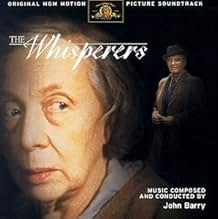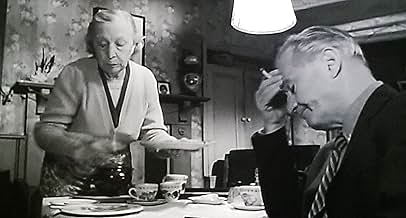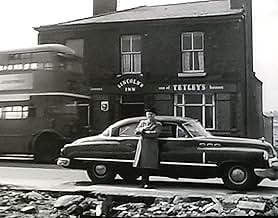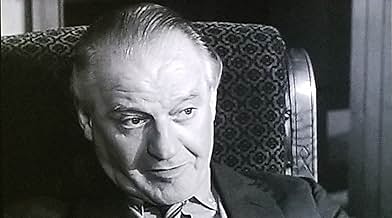IMDb रेटिंग
7.1/10
1.6 हज़ार
आपकी रेटिंग
अपनी भाषा में प्लॉट जोड़ेंA lonely elderly Englishwoman talks to herself and hears voices talking about her.A lonely elderly Englishwoman talks to herself and hears voices talking about her.A lonely elderly Englishwoman talks to herself and hears voices talking about her.
- 1 ऑस्कर के लिए नामांकित
- 9 जीत और कुल 4 नामांकन
फ़ीचर्ड समीक्षाएं
What really hooked me into this film, right from the first shots of the opening credits, was the fantastic photography in here. This is one beautiful-looking black-and-white film.
The superb work of photographer Gerry Turpin and Director Bryan Forbes made this bleak story all the better with just the right amount of closeups and odd-angle shots, and some striking film noir-like light and shadows. This would be a stunner in high-definition.
Then, of course, you have the wonderful acting by Edith Evans, who plays the central character, "Mrs. Ross." Some think she got robbed out of the Oscar the year this was eligible, and they may be right. Not to be overlooked was Eric Portman, who entered the movie about halfway through and he, too, was riveting. He played "Archie," the long-departed husband who comes back (reluctantly) to his now-ailing wife. Portman almost takes over the spotlight in the second-half of the film, but it's still Evans' being the one you'll remember most and the undisputed star of the film.
Yes, the story is a bit sordid in a few spots but I didn't find it depressing, as others have. Instead, I just marveled at the camera-work and considered the story a good character study.
It's a pity this film isn't better-known. It deserves a bigger audience.
The superb work of photographer Gerry Turpin and Director Bryan Forbes made this bleak story all the better with just the right amount of closeups and odd-angle shots, and some striking film noir-like light and shadows. This would be a stunner in high-definition.
Then, of course, you have the wonderful acting by Edith Evans, who plays the central character, "Mrs. Ross." Some think she got robbed out of the Oscar the year this was eligible, and they may be right. Not to be overlooked was Eric Portman, who entered the movie about halfway through and he, too, was riveting. He played "Archie," the long-departed husband who comes back (reluctantly) to his now-ailing wife. Portman almost takes over the spotlight in the second-half of the film, but it's still Evans' being the one you'll remember most and the undisputed star of the film.
Yes, the story is a bit sordid in a few spots but I didn't find it depressing, as others have. Instead, I just marveled at the camera-work and considered the story a good character study.
It's a pity this film isn't better-known. It deserves a bigger audience.
This grim tale about the loneliness and vulnerability of old age, set in what must be the most rundown section of Manchester, manages to touch us in an unsentimental manner. Its chief quality is the crisply photographed slum in which it largely takes place, like the last remains of the 19th century surviving into the post-War 20th. The protagonist, Margaret Ross, played by the stately Edith Evans, lives in a cluttered ground floor flat in this urban wasteland of rain-slicked cobblestone streets without cars or pedestrians, but an abundance of crumbling brick walls, gutted buildings and stray cats. The opening credit sequence of grey rooftops under rainy skies is particularly striking.
At home she looks through newspapers, eats bread with honey, sips tea and listens to radio as her sink faucet drips, drips, drips. She constantly hears voices (the "whisperers" of the title) and turns up the radio to drown them out. When the upstairs neighbors, an interracial couple with an infant, pound on the floor in protest, she pounds back on the ceiling with a broomstick and is showered with bits of plaster. (We see the bald patch from where the plaster has fallen but the absence of other patches means that she has never before banged on the ceiling; this strand of the story would have been more convincing if more of the ceiling was similarly defaced.) When not talking to the imagined voices, she spends her solitary life visiting the library where she surreptitiously warms her feet on the heating pipes, collecting welfare from a local government office where she makes frequent references to her good breeding and high-class family connections, listening to sermons at a local evangelical storefront chapel, and tending to household chores which seem to consist mostly of emptying large quantities of dust, coal ashes and bottles and cans from which she derives most of her nourishment.
Evans brings dignity to the role but somehow she does not seem to be the right actress for the part. Margaret Ross is a woman of humble origins. Evans is a thoroughbred. True, she does claim that she married beneath herself, but that would be putting it mildly. Still, she has the acting skills to keep us entertained, and she gets brilliant support from the secondary players: Eric Portman as her surly husband, Avis Bunnage as a predatory welfare mom and Gerald Sim as a welfare clerk add a great deal to the overall presentation. Leonard Rossiter, too, shows up for a strong few minutes as a government official. And John Barry supplies a melancholy but unobtrusive musical score.
Evans got an Oscar nomination for this performance. Fair enough. But I think Gerry Turpin should have also gotten one for his beautiful cinematography.
At home she looks through newspapers, eats bread with honey, sips tea and listens to radio as her sink faucet drips, drips, drips. She constantly hears voices (the "whisperers" of the title) and turns up the radio to drown them out. When the upstairs neighbors, an interracial couple with an infant, pound on the floor in protest, she pounds back on the ceiling with a broomstick and is showered with bits of plaster. (We see the bald patch from where the plaster has fallen but the absence of other patches means that she has never before banged on the ceiling; this strand of the story would have been more convincing if more of the ceiling was similarly defaced.) When not talking to the imagined voices, she spends her solitary life visiting the library where she surreptitiously warms her feet on the heating pipes, collecting welfare from a local government office where she makes frequent references to her good breeding and high-class family connections, listening to sermons at a local evangelical storefront chapel, and tending to household chores which seem to consist mostly of emptying large quantities of dust, coal ashes and bottles and cans from which she derives most of her nourishment.
Evans brings dignity to the role but somehow she does not seem to be the right actress for the part. Margaret Ross is a woman of humble origins. Evans is a thoroughbred. True, she does claim that she married beneath herself, but that would be putting it mildly. Still, she has the acting skills to keep us entertained, and she gets brilliant support from the secondary players: Eric Portman as her surly husband, Avis Bunnage as a predatory welfare mom and Gerald Sim as a welfare clerk add a great deal to the overall presentation. Leonard Rossiter, too, shows up for a strong few minutes as a government official. And John Barry supplies a melancholy but unobtrusive musical score.
Evans got an Oscar nomination for this performance. Fair enough. But I think Gerry Turpin should have also gotten one for his beautiful cinematography.
This may be the bleakest of all the 'kitchen sink' movies, (it is unremittingly gloomy) and Bryan Forbes' picture of the British Welfare State in the 1960's has an almost Dickensian feel to it. But then Forbes always seemed to work better with subjects which didn't lend themselves to levity.
It's the story of Mrs Ross, a pensioner living on her own and beset by the voices one hears when one is so lonely and in the part Edith Evans is quite magnificent. If you think Evans too patrician for the part of an old woman living in a working class district of an industrial, mostly derelict and rain-sodden city, she does point out that 'she married beneath her' and since she is hardly ever off the screen this is a real tour-de-force, (and she was nominated for the Oscar for it as well as winning a whole slew of other awards). There are also first-rate supporting performances from the wonderful Avis Bunnage and the always consistently reliable Gerald Sim and Eric Portman, terrific as her errand husband). Unfortunately the film's sub-plots involving stolen money and some gangsters seems superfluous and gives the film a somewhat melodramatic air and its down-beat mood meant it was never a popular success and it is hardly ever revived. But seek it out, all the same; it is certainly worth seeing.
It's the story of Mrs Ross, a pensioner living on her own and beset by the voices one hears when one is so lonely and in the part Edith Evans is quite magnificent. If you think Evans too patrician for the part of an old woman living in a working class district of an industrial, mostly derelict and rain-sodden city, she does point out that 'she married beneath her' and since she is hardly ever off the screen this is a real tour-de-force, (and she was nominated for the Oscar for it as well as winning a whole slew of other awards). There are also first-rate supporting performances from the wonderful Avis Bunnage and the always consistently reliable Gerald Sim and Eric Portman, terrific as her errand husband). Unfortunately the film's sub-plots involving stolen money and some gangsters seems superfluous and gives the film a somewhat melodramatic air and its down-beat mood meant it was never a popular success and it is hardly ever revived. But seek it out, all the same; it is certainly worth seeing.
"The Whisperers" is the kind of movie you curl up with on a rainy day. I had the fortune of catching it on Turner Classic Movies once and I was mesmerized. Edith Evans gives a completely convincing performance as a lonely old woman living in a run down apartment (or flat) in London. Clearly, she is bordering on senility or dementia as she imagines voices coming from faucets, her radio, and suspects her neighbors are spying on her. She imagines herself an heiress (as she frequently reminds her social worker at the Public Assistance Board) waiting for her inheritance to come through. It is sad to see her begging for a new pair of shoes or a pound to get food. Before the film ends, you will find yourself concerned for her well being as though she is a real person. Perhaps it is the realization that many old people the world over live this very existence. I had the good fortune to find this movie available on video through Movies Unlimited. Act fast as it is out of print. Perhaps it will be available on DVD in the future.
The supremely versatile film-maker, Bryan Forbes directs a remarkably bleak and eerily unsettling treatise on the multifarious cruelties inherent with old age. 'The Whisperers' (1967) remains a forceful, extraordinarily persuasive work of melancholic cinema that has lost none of its considerable power to enthral and perturb with equally forceful cinematic rigour! It would be greatly remiss of me if I failed to praise maestro, John Barry's truly magnificent score!
No small admirer of, Brian Forbes's dazzlingly ecclectic cinema, I passionately believe that 'The Whisperers' remains one of his finest films. Exquisitely shot, with exemplary performances, the magisterial, Edith Evans on positively mesmeric form, movingly delivering one of cinema's most genuinely affecting performances. It is tantamount to a cultural travesty that this monochrome masterpiece has long been allowed to mildew away in undeserved obscurity. 'The Whisperers', along with the equally unsettling existential nightmare 'Séance on a Wet Afternoon' are arguably two of the more compelling dramas produced during the UK's dynamic Renaissance of the 1960s. Hopefully some tasteful, forward-thinking celluloid archivist might soon release this exceptionally fine film on a restored, features-packed Blu-ray!
No small admirer of, Brian Forbes's dazzlingly ecclectic cinema, I passionately believe that 'The Whisperers' remains one of his finest films. Exquisitely shot, with exemplary performances, the magisterial, Edith Evans on positively mesmeric form, movingly delivering one of cinema's most genuinely affecting performances. It is tantamount to a cultural travesty that this monochrome masterpiece has long been allowed to mildew away in undeserved obscurity. 'The Whisperers', along with the equally unsettling existential nightmare 'Séance on a Wet Afternoon' are arguably two of the more compelling dramas produced during the UK's dynamic Renaissance of the 1960s. Hopefully some tasteful, forward-thinking celluloid archivist might soon release this exceptionally fine film on a restored, features-packed Blu-ray!
क्या आपको पता है
- ट्रिवियाThe director Bryan Forbes and Nanette Newman, who played the upstairs neighbor, were husband and wife.
- गूफ़The old kitchen curtain is shown in scene after Archie leaves, while Margaret is moping around the apartment. The new curtains are shown again after she returns from seeing Mr. Conrad at the National Assistance Board.
- भाव
Archie Ross: What kind of job might it be, sir?
Mr. Conrad: Doorman at a cinema.
Archie Ross: Oh, wonderful. Nice and healthy and in the open.
Mr. Conrad: The healthiest jobs, Mr. Ross, are the ones you keep.
- कनेक्शनVersion of ITV Play of the Week: The Whisperers (1961)
- साउंडट्रैकShall We Gather at the River?
(uncredited)
Written by Robert Lowry
Performed by Edith Evans and mission attendees
टॉप पसंद
रेटिंग देने के लिए साइन-इन करें और वैयक्तिकृत सुझावों के लिए वॉचलिस्ट करें
- How long is The Whisperers?Alexa द्वारा संचालित
विवरण
- चलने की अवधि1 घंटा 46 मिनट
- रंग
- ध्वनि मिश्रण
- पक्ष अनुपात
- 1.66 : 1
इस पेज में योगदान दें
किसी बदलाव का सुझाव दें या अनुपलब्ध कॉन्टेंट जोड़ें

































